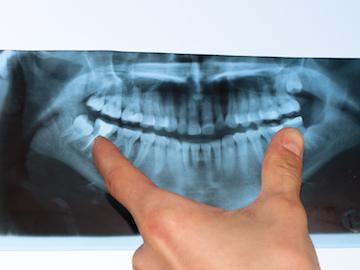TMJ & Bruxism Treatment in Bellevue
 Do you grind your teeth? Most people do, but it’s usually during moments of stress or concentration. This happens to everyone occasionally and is nothing for you to worry about unless it persists.
Do you grind your teeth? Most people do, but it’s usually during moments of stress or concentration. This happens to everyone occasionally and is nothing for you to worry about unless it persists.
But a teeth grinding habit—also called bruxism—that causes headaches or pain in your jaw is often a sign that you have a problem with your TMJ or jaw joint.
At Kennedy Dental, our team of dentists and specialists offer personalized TMJ and bruxism treatment at our Bellevue, NE dental office. In many cases, all that's needed is a customized nightguard to relieve discomfort and prevent damage like worn or broken teeth.
TMJ & Teeth Grinding Explained
Your TMJ (temporomandibular joints) are the joints on either side of your head that connect your lower jaw to your upper jaw.
Your TMJ is a complex joint, and it gets a lot of use every day because it controls the up and down and side to side movement of your lower jaw. But if you grind your teeth, you’re putting even more stress on the TMJ.
When there’s a problem with the way your jaw joint works, we call it Temporomandibular Joint Disorder or TMD. Aside from the stress of teeth grinding, TMJ disorders can be caused by:
- Arthritis
- Jaw joint dislocation
- Injury to the jaw
- Tooth and jaw alignment
- Dental bite problems
Teeth grinding often occurs while you sleep, so you may not even be aware that you’re doing it. But our dentists will know because they will see the evidence in the form of worn, fractured, or broken teeth.
Symptoms of TMJ Problems
 Some common symptoms of TMD that you may experience are:
Some common symptoms of TMD that you may experience are:
- Pain in your jaw
- Pressure behind your eyes
- Frequent headaches or migraines
- Soreness in your neck or shoulders
- Trouble opening and closing your mouth
- Popping or clicking sounds in your jaw joint
- Jaw locked open or closed
Just as you rest sore, tired muscles in other parts of your body, a painful, overworked jaw joint needs rest to recover. At Kennedy Dental, we have the TMJ treatment you need.
Treatment to Relieve TMJ Pain in Bellevue, NE
Before we can recommend treatment, our Bellevue, NE dentists need to evaluate your jaw to identify the source of your TMJ pain. This exam includes taking x-rays and checking your TMJ for popping or clicking sounds, tenderness, or difficulty moving your jaw.
The first step is to customize a night guard that you wear over your upper teeth while you sleep. The guard prevents your upper and lower jaw from coming into direct contact while you sleep, which gives your sore TMJ a chance to rest and recover.
Along with a custom night guard, our Bellevue dentists may recommend that you:
- Switch to a softer diet
- Avoid chewing gum
- Don’t bite your nails
- Do exercises to strengthen the TMJ
- Practice relaxation techniques like meditation
In some cases, if these approaches aren't helping you, our TMJ dentists in Bellevue may prescribe muscle relaxants, anti-anxiety drugs, or anti-inflammatory medications.
Call Kennedy Dental for TMJ Pain Relief!
The symptoms of TMJ problems and teeth grinding can disrupt your life and damage your teeth. If you need relief for TMJ pain near Bellevue, please give Kennedy Dental a call at (402) 291-3535 to schedule a consultation with one of our dentists.




